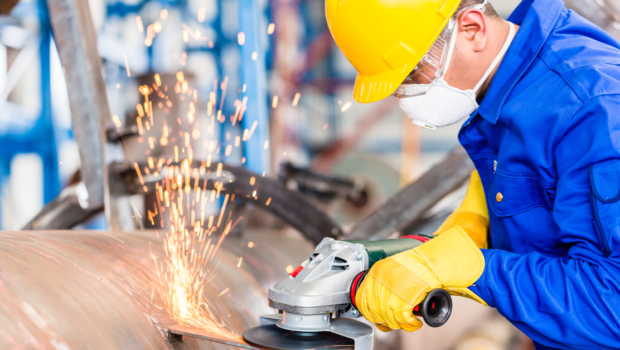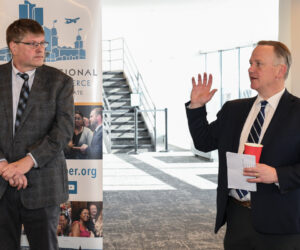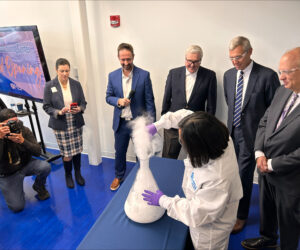Whether it’s a local or a global market, Adapting is the name of the game
By Dominique Goyette-Connerty, Correspondent
Each year, the first Friday in October is recognized as Manufacturing Day — an opportunity for manufacturers to highlight their work and inspire a pipeline of future workers.
This year, the Worcester Regional Chamber of Commerce marked the occasion by hosting a Manufacturing Roundtable where two industry leaders shared how their respective companies have confronted challenges and made changes amid the coronavirus pandemic.
Like so many others in the country and the world, nearby importer-exporter Euro-American Worldwide Logistics and manufacturer FLEXcon North America were forced to adapt quickly at the onset of the COVID-19 outbreak, pivoting their operations and adjusting their business models.
For Euro-American, a family-owned business located at the Worcester Regional Airport and a third-party logistics provider for the life sciences industry both domestically and abroad, one of the most significant hurdles they’ve faced is international travel bans. As a company which ships a lot of pharmaceuticals into the U.S. that are manufactured overseas, “It’s been very chaotic,” says President Eric Busenburg.
A majority of what’s being imported into the U.S. goes in the belly of the aircraft, meaning when passengers are flying internationally, whatever space is left over after luggage is accounted for is where cargo goes. But beginning in March, travel bans caused fewer people to fly. According to Mr. Busenburg, 95 percent of aircrafts were grounded which led to a 500 percent increase in prices for shipping. “If airlines can’t make money, they can’t fly planes,” he says, adding that sea freight faced similar troubles, with 45 percent of sailings canceled and a 75 percent increase in prices.
While the company’s outlook on the economy is grim, Mr. Busenburg says there have been some bright spots in all of this: “We’re forced to innovate. It’s a good thing.” Airlines turned to re-purposing passenger aircrafts, removing the seats in order to carry all cargo. Ocean freight has started offering more refrigerated shipping containers to meet the demands for shipping certain products. And as a result, they were able to absorb a lot of the business from the pharma and food industries whose products have a non-negotiable shelf life and had to get to market.
Mr. Busenburg says the economy was already on a downward trend prior to the pandemic, which only made it worse. Euro-American anticipates that decline to continue and is planning accordingly.
Meanwhile, FLEXcon North America started the year with high hopes, and while 2020 has certainly shaped up to be a year to remember, CEO Lavon Winkler says it’s not in the way he’d imagined.
A company which specializes in making pressure-sensitive adhesives, FLEXcon has 14 locations worldwide, nine manufacturing sites, and around 1,000 employees — with FLEXcon North America headquartered in Spencer being the largest.
Making materials used for labeling of food, beverage, personal hygiene, medical, and pharmaceutical products put them in the “essential business” category when coronavirus-related closures were announced. “If our products aren’t available — the right products at the right time — it interrupts supply chains and keeps those products from getting in the hands of the consumers and people who need it.”
Mr. Winkler says in order to keep the business operating, and not create that disruption in the supply chain, they needed to ensure they were keeping their employees safe by developing processes and protocols which managed the risk of COVID-19 in their facilities.
With revenues down around nine percent, Mr. Winkler says the year hasn’t been as “financially fruitful as anticipated,” but there are some bright spots.
When asked by local health care workers to make personal protective equipment on two separate occasions amid the virus’s initial peak, the team at FLEXcon was able to design and prototype face shields and tent hoods within about 48 hours, using materials they already had in-house. They went on to donate 20,000 face shields to area hospitals, health care facilities, and first responders; the other 100,000 were sold at cost.
Aside from those two new product offerings, Mr. Winkler says their prime label business (materials they make for labeling products such as shampoo) is up, while their more durable product identification business is down, throwing things off a little.
Though they project this declining economic trend will continue through fiscal year 2021, FLEXcon is “making some changes to counteract this prediction,” Mr. Winkler says. Over the last few years, the company has been positioning itself for the future by emphasizing process and people development. “We believe at FLEXcon that the people are the company […] so we invest heavily in the development and training of our folks.” This investment in their employees is also reflected by their no layoffs practice, which has helped keep around 500 people in the region employed at a time when millions of Americans have lost their jobs.
ABOUT THE ROUNDTABLE
Held quarterly and sponsored by both Saint-Gobain and the MassHire Central Region Workforce Board, the Chamber’s Manufacturing Roundtable provides industry members the opportunity to share issues they face in their business, discuss best practices, seek support from others, and learn about programs and benefits available to assist them. For more information or to get involved, please contact Alex Guardiola, the Chamber’s director of government affairs and public policy, at aguardiola@worcesterchamber.org.





